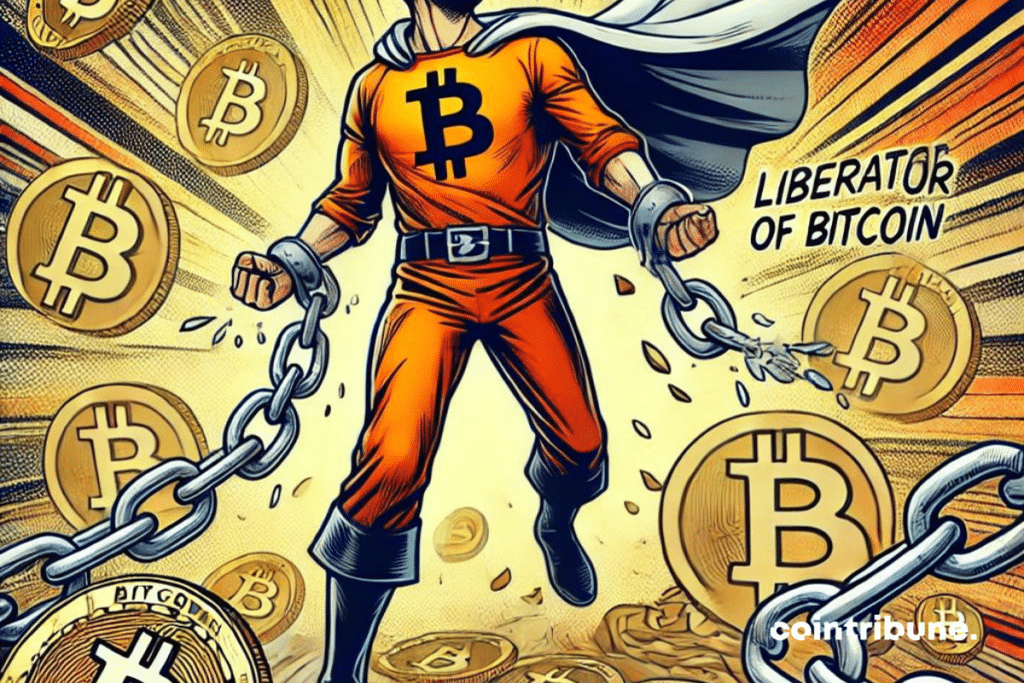Bitcoin: Why Does Trump Want To Save Ross Ulbricht?
Wednesday, Donald Trump revived a promise that has already created much buzz: saving Ross Ulbricht, the founder of the infamous Silk Road marketplace. The latter, in prison for 12 years, has become a controversial symbol both of the early Bitcoin era and of government excesses in the fight against cybercrime. Trump, by reiterating his commitment, raises once again a burning debate around justice, cryptocurrencies, and individual freedoms. But why this sudden interest in such a sensitive case?

Ulbricht, Silk Road and the Rise of Bitcoin
Silk Road, launched in 2011, was not just a simple darknet marketplace. It was the fertile ground where Bitcoin truly made a name for itself, well before its mass adoption.
By enabling anonymous transactions for often illegal goods, Silk Road propelled Bitcoin to the world stage. This market embodied the decentralization and anonymity promised by cryptocurrencies but also drew the attention of authorities.
Ross Ulbricht, under the pseudonym “Dread Pirate Roberts,” was arrested in 2013 for creating and managing this platform.
Sentenced to two life imprisonments without the possibility of release, he is today at the heart of a case that divides as much as it fascinates. On one side, some consider him a martyr for individual liberties and technological innovation; on the other, he is seen as the head of a criminal empire.
Trump’s commitment to freeing Ulbricht, loudly expressed on Truth Social, not only revives the memory of Silk Road but also debates on the limits of American justice and Bitcoin’s role in this story. Trump seems to view this case as a political opportunity but also as a symbol of his commitment to fighting what he calls “the deep state.”
A Promise of Freedom
Trump’s interest in Ross Ulbricht is not new. Already in May 2024, during the Libertarian National Convention, he had promised to commute Ulbricht’s sentence if he were re-elected president.
For Ulbricht’s supporters, this promise was a ray of hope. Ulbricht himself, via Twitter, expressed his gratitude for this wave of support. But behind these statements lies a crucial question: Is Trump really seeking to defend a more equitable justice, or is he using this case to woo libertarian voters, fervent advocates of cryptocurrencies?
The answer is not simple. On one side, some believe Trump sees Ulbricht as a symbol of the fundamental freedoms undermined by the State. For them, saving Ulbricht, is about tackling government abuses in its fight against digital crime while strengthening the promise of decentralization that Bitcoin embodies.
On the other hand, his critics see it as a mere electoral maneuver, intended to capitalize on the support of pro-Bitcoin communities, whose political influence continues to grow.
In any case, Trump’s promise reopens an old wound in the crypto community. While some support Ulbricht’s release as a matter of justice, others recall the detrimental consequences of Silk Road.
For them, Ulbricht’s involvement in a platform facilitating the sale of drugs and other illegal goods cannot be glossed over, even if Bitcoin emerged stronger.
A Symbol that Transcends Justice and Bitcoin
Beyond the political aspect, Ross Ulbricht’s story strikes a sensitive chord in the Bitcoin world. Silk Road was the first concrete example of the large-scale use of crypto, but it also highlighted the inherent risks of the anonymity offered by crypto-assets. Today, Bitcoin is much more than just a tool of exchange: it has become a symbol of financial freedom for some and a threat to the established order for others.
By committing to save Ulbricht, Trump is not just reopening a judicial case. He touches on a fundamental question: to what extent should the State intervene to regulate new technologies like Bitcoin? And above all, where is the line between innovation and criminality?
If Ulbricht is released, it could be interpreted as a victory for proponents of decentralization and individual freedoms. But it would also raise questions about how justice handles cases related to new technologies. Can we really separate Ulbricht from the image of Silk Road and all that it represents? The answer remains uncertain.
Maximize your Cointribune experience with our "Read to Earn" program! For every article you read, earn points and access exclusive rewards. Sign up now and start earning benefits.

Fascinated by Bitcoin since 2017, Evariste has continuously researched the subject. While his initial interest was in trading, he now actively seeks to understand all advances centered on cryptocurrencies. As an editor, he strives to consistently deliver high-quality work that reflects the state of the sector as a whole.
The views, thoughts, and opinions expressed in this article belong solely to the author, and should not be taken as investment advice. Do your own research before taking any investment decisions.